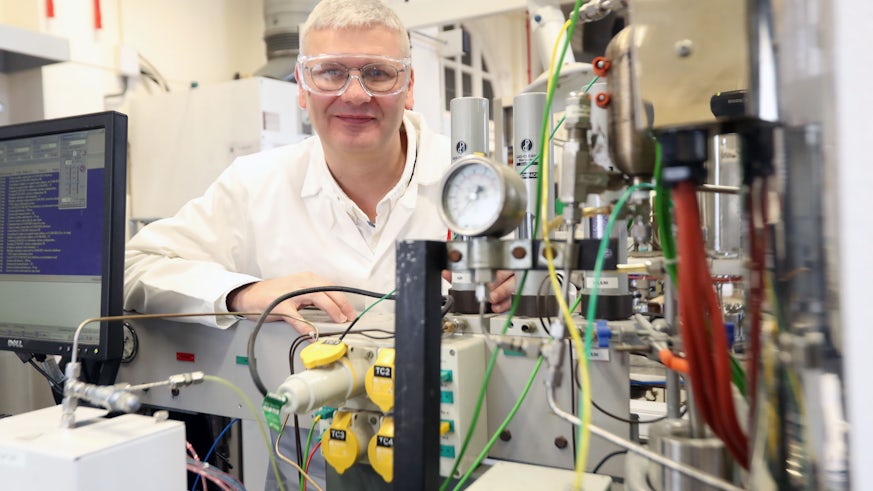Catalysis pioneer wins Environment Prize
16 June 2023

A leading Cardiff University professor spurred on by visual impairment to build a stellar research career has been honoured for his pioneering work to create catalysts that help the environment.
Professor Stuart Taylor, Director of Research, School of Chemistry, has won the Royal Society of Chemistry’s Environment Prize.
A citation, from the Society’s President, Professor Gill Reid, notes Professor Taylor’s ‘discovery of catalysts that have been commercialised for environmental protection, including carbon monoxide oxidation catalysts for critical life support applications.’
“I am absolutely delighted to receive this prize,” said Professor Taylor. “It reflects achievements over many years, and I am profoundly grateful to all my students, colleagues and collaborators who have supported me throughout my career, making the research so enjoyable.”
A catalyst is a substance that increases the rate of a chemical reaction but is not consumed in the reaction. It is estimated that at least 80% of manufactured goods require a catalyst during their production.
With more than 30 years of experience in heterogeneous catalysis research, 350 papers and over 14,000 citations, Professor Taylor is consistently identified in the top 2% of researchers by the Stanford University World Ranking of Scientists.
A Fellow of the Learned Society of Wales, Professor Taylor was awarded the 2022 Sir John Meurig Thomas Catalysis Medal by the UK Catalysis Hub.
During the early stages of his academic career, Professor Taylor became registered blind - a transition that presents continuous challenges.
“More than 22 years later, I do not view my visual impairment as a hindrance. In fact, it has become a source of motivation for me to focus on what I can achieve, rather than dwelling on my limitations. In the realm of chemical science research, I am reminded that diverse perspectives and varying viewpoints are integral to advancing scientific progress through discourse, and this only emphasises to me that we all see things differently.”
Professor Damien Murphy, Head of the School of Chemistry, said: “I am delighted with this timely and well-deserved recognition of Stuart’s research as recipient of the 2023 RSC Environment, Sustainability and Energy Prize - Environment. His fundamental understanding into the development of catalysts for delivering real-world impact in CO oxidation has been transformative, enabling contaminated air to be purified in challenging environments. This is one of several examples where catalysis in Cardiff Catalysis Institute is making a positive contribution to innovation and commercialisation, and where Stuart’s outstanding research has lasting benefits.”
Professor Taylor added: “As a society, we are facing many challenges: we need to ensure clean water supplies, protect the environment, and find new ways to manufacture things in cleaner, more efficient and sustainable ways.
“Chemistry, and in particular catalysis, will provide the solutions to achieve these aims, as well as providing new practical technologies to deal with some of the more pressing problems we face like recycling of plastics and combatting global warming.”
Professor Taylor has wide ranging expertise in experimental studies of catalysis, exploiting preparation techniques for fundamental catalyst understanding and design. His work impacts on chemicals, fuels, sustainability, energy, and the environment.
Following his award from the Society’s Environment, Sustainability and Energy Prize Committee, Professor Taylor will be invited to deliver a series of prize lectures at universities across the UK and Ireland in 2024.
For more information about the RSC’s revised prizes portfolio, visit rsc.li/prizes.
Share this story
The School tackles the important scientific challenges of the 21st century which is the focus of its internationally leading research and education.



